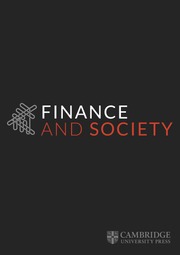Article contents
The social meaning of financial wealth: Relational accounting in the context of 401(k) retirement accounts
Published online by Cambridge University Press: 09 November 2023
Abstract
Behavioral economics has become a dominant set of theories in explaining economic behavior, yet such behavior remains under the limited purview of psychological, cognitive, or neural approaches. This article draws on and extends Viviana Zelizer's social meaning of money framework in conjunction with new work in ‘relational accounting’ to suggest a sociological counterpoint, focusing in particular on the social and symbolic meaning attached to individual 401(k) retirement accounts. Following a market downturn, neoclassical and behavioral economics predict various types of behavioral responses, in particular loss aversion - where investors seek to increase risk-taking rather than locking in a sure loss (a loss is more painful to bear than an equivalent gain). A sociological theory that understands the shared meaning of retirement saving would predict something different, a behavior I call durable conservatism. In this article, I show how this concept better explains observed risk behavior in Americans’ 401(k) accounts following the 2002 and 2008 bear markets in stocks, and how that response differed from the behavior documented in non-retirement brokerage accounts.
- Type
- Article
- Information
- Creative Commons
- This is an Open Access article, distributed under the terms of the Creative Commons Attribution-NonCommercial-No Derivatives licence (http://creativecommons.org/licenses/by-nc-nd/4.0/), which permits noncommercial re-use, distribution, and reproduction in any medium, provided the original work is unaltered and is properly cited. The written permission of Cambridge University Press must be obtained for commercial re-use or in order to create a derivative work.
- Copyright
- © 2019 The Author(s)
References
Data sources
References
- 6
- Cited by


